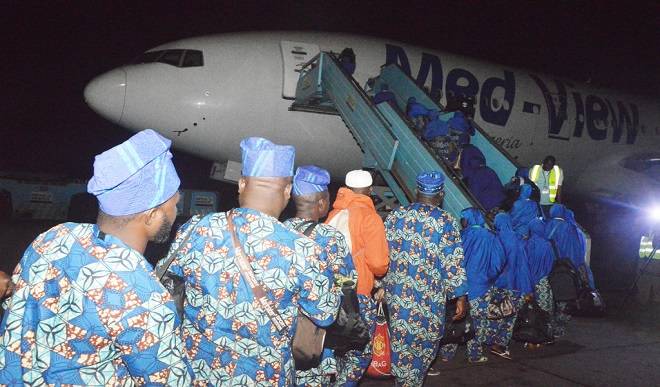As intending Pilgrims across the 36 states of Nigeria and FCT prepare for the 2019 hajj exercise, the National Hajj Commission of Nigeria (NAHCON) gave explanations on some development that Nigerian Pilgrims should expect during 2019 Hajj operations.
NAHCON Head of Public Affairs Division, Fatima Usara, who gave the details on Monday in Abuja also provided advise to intending pilgrims on the best ways to conduct themselves in the holy land.
She said by the first week of July, the Saudi Arabian airspace would begin to receive pilgrims from different countries, signifying onset of 2019 Hajj season.
NAHCON is expected to be among those whose pilgrims would be making early entrance for the pilgrimage within the first week of the season, July 10 to be precise.
Here are few developments that pilgrims should expect in 2019 Hajj operations.
1. Each pilgrim that has completed initial payment of Hajj fares for 2019 slot should expect a refund of a little over N51,000; Nigerian pilgrims have been saved payment of about N3.326 billion through this discount.
Considering the huge cumulative amount, declaring the discount itself is considered a testimony of NAHCON leadership’s stance on accountability and transparency.
2. If Saudi Arabian authorities concluded arrangements to screen pilgrims from across their respective countries’ departure centres, Nigerian intending pilgrims should expect immigration screening by Saudi Arabia here in Nigeria in an arrangement code named “Makka Road Project”.
Under this arrangement, intending pilgrims would be relieved of their hand luggage from their departure points only to receive them upon arrival in their designated hotels in Makka or Madinah, which reduces the risk of being scammed with drugs as well as reduce waiting time at Saudi airports.
3. On security matters, a security analyst pointed out that after election periods, Hajj season is the next most security challenging times for Nigerian security apparatus.
Indeed, the two occasions propel movement of large number of people at the same time, creating room for people with dangerous motives to try to unleash their wicked machinations.
It is the responsibility of government to anticipate and apprehend evil plots in order to protect Nigerians going to cast their votes or going to participate in Hajj, adding that pilgrims must bear thorough security screening during this year’s Hajj exercise.
Access restriction at the vicinity of the pilgrims’ camps shall be maximized, movement of people would be controlled around Hajj transit camps or departure centres to protect pilgrims from being conned especially those coming from the rural areas.
The 2019 intending pilgrims must avoid being escorted by a large entourage to avoid embarrassment.
Intending pilgrims are advised to report any untoward activities or suspicious persons to officials in the respective areas they find themselves and should relate any rumours to the same officials.
4. As much as possible, intending pilgrims should not encourage hawkers coming near parameter fencing of where they are being camped.
Directives have been given for any essential service and facility to be put in place in Hajj camps and departure centres to forestall hoodlums from gaining access to pilgrims under the pretext of helping them with such necessities.
Same security surveillance would be extended to the Nigerian pilgrims in Makkah and Madinah considering the reprehensible assaults carried out on some of them during last year’s exercise.
In Madinah accommodation for example, each lodging has a House Manager whose contact number would be hung in the reception area for advice on credible bureau–de-change outlets, on any matter of interest to the pilgrims.
In addition, the House Manager is responsible for House keeping and security monitoring, one of which is to ensure that unauthorised residents known as Takaris do not have access into the hotels.
Pilgrims are thus warned not to patronize the Takaris nor smuggle them into their rooms because of the risks in doing so.
Other responsibilities of the House Manager and his team are overseeing the supply of toiletries, ensuring that pilgrims’ beddings are constantly changed, as well as to ensure cleanliness of the environment.
However, pilgrims should assist the House Manager by making the necessary requests to know where help is needed.
There is also the NAHCON helpline through which complaints can be lodged while in Saudi Arabia; +966920008251.
5. At departure times in both Nigeria and Saudi Arabia, pilgrims must bear in mind that certain clearance procedures demand extra hours stay in the airports or departure centres.
They should understand that they might not leave for their destination within 12 hours of being called to camp, not due to inefficiency but as a screening procedure.
In Saudi Arabia for instance, it may take a maximum of 24 hours before pilgrims set off for Nigeria after being called to converge for the return trip.
In Nigeria, it may also take up to 24 hours which, may be worsened by some pilgrims’ reluctance to assemble in the Hajj camps when being called to do so; and since the airlines would not fly with little number of persons on board, the waiting time is prolonged.
Apart from these reasons, there may be others such as disorderliness by the pilgrims which often leads to temporary cessation of screening until they comport themselves.
To ease stress of waiting time before departure for pilgrimage is one of the reasons why NAHCON is erecting hotel facilities across all Hajj transit camps in the country to make the wait as comfortable as possible.
Hence, pilgrims’ civility is necessary both within and outside the country.
Proper comportment at the airports fast-tracks clearance and onward movements and eases the work of the security personnel, Hajj managers and other stakeholders.
It also projects a positive image of the country such that elicited various commendations for Nigerian pilgrims in the previous year.
6. During days of Hajj rites, pilgrims are expected to await directives from their state officials pertaining to when to proceed for Jamrat stoning and Tawaf.
According to Saudi Arabian sources, the two rituals would now be delimited to control over-crowdedness.
7. Pilgrims travelling through Private Tour Operators should expect to pay a little extra for rail transportation to Makkah.
It was observed that these categories of pilgrims usually arrive the Kingdom late when most transport companies have leased out their vehicles.
The arrangement is therefore to accommodate insufficiency of buses occasioned by increased movement of pilgrims during the period leading to ayyamul tashrie (days of Hajj rites).
8. On a final note, it is hoped that the feeding arrangements put on ground for Nigerian contingent would satisfy and impress them.
It is the hope of the Commission that pilgrims would enjoy dishes from indigenous cuisines to be prepared by Nigerians in collaboration with their Saudi Arabian business counterparts.
Besides, there is provision for special diets.
However, if the dishes fail to satisfy our pilgrims, specific complaints are welcome.
The details in the complaint should include the state where the meal was served, time, type and reason for the disapproval. (NAN)

 Join Daily Trust WhatsApp Community For Quick Access To News and Happenings Around You.
Join Daily Trust WhatsApp Community For Quick Access To News and Happenings Around You.

